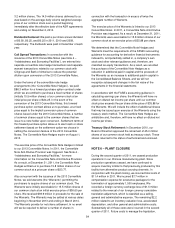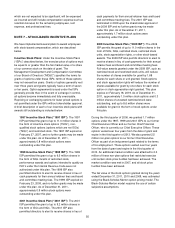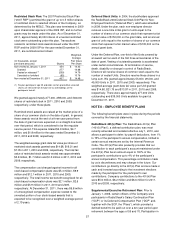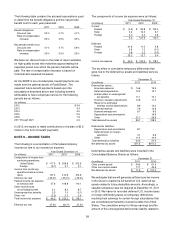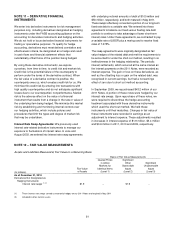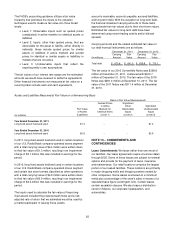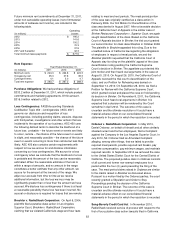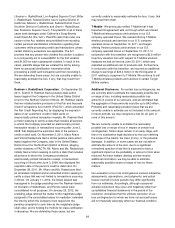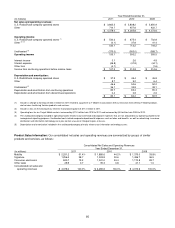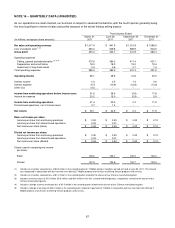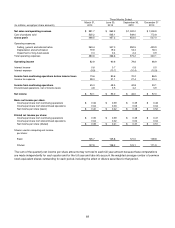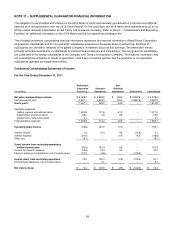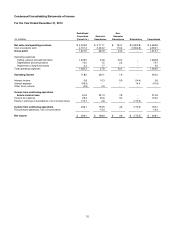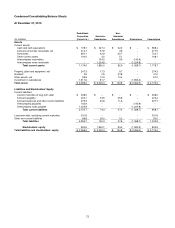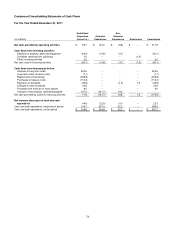Radio Shack 2011 Annual Report Download - page 72
Download and view the complete annual report
Please find page 72 of the 2011 Radio Shack annual report below. You can navigate through the pages in the report by either clicking on the pages listed below, or by using the keyword search tool below to find specific information within the annual report.64
(Sosinov v. RadioShack, Los Angeles Superior Court; Bitter
v. RadioShack, Federal District Court, Central District of
California; Moreno v. RadioShack, Federal District Court,
Southern District of California; and Grant v. RadioShack,
San Francisco Superior Court). The plaintiffs in all of these
cases seek damages under California’s Song-Beverly
Credit Card Act (the “Act”). Plaintiffs claim that under one
section of the Act, retailers are prohibited from recording
certain personal identification information regarding their
customers while processing credit card transactions unless
certain statutory exceptions are applicable. The Act
provides that any person who violates this section is subject
to a civil penalty not to exceed $250 for the first violation
and $1,000 for each subsequent violation. In each of the
cases, plaintiffs allege that we violated the Act by asking
them for personal identification information while
processing a credit card transaction and then recording it.
We are defending these cases, but are currently unable to
reasonably estimate the loss, if any, that may result from
them.
Redman v. RadioShack Corporation: On September 26,
2011, Scott D.H. Redman filed a putative class action
lawsuit against the Company in the United States District
Court for the Northern District of Illinois. Mr. Redman claims
that we violated certain provisions of the Fair and Accurate
Credit Transactions Act of 2003 (“FACTA”), which amended
the Fair Credit Reporting Act, by displaying the expiration
dates of our customers’ credit or debit cards on
electronically printed transaction receipts. Mr. Redman filed
a motion seeking to certify a class that includes all persons
to whom the Company provided an electronically printed
transaction receipt, in transactions occurring after June 3,
2008, that displayed the expiration date of the person’s
credit or debit card. On November 3, 2011, Mario Aliano
and Vitoria Radavicuite filed a similar putative class action
lawsuit against the Company, also in the United States
District Court for the Northern District of Illinois, alleging
similar violations of FACTA. Mr. Aliano and Ms. Radaviciute
initially filed a motion seeking to certify a class that includes
all persons to whom the Company provided an
electronically printed transaction receipt, in transactions
occurring in Illinois after June 3, 2008, that displayed the
expiration date of the person's credit or debit card. On
December 28, 2011, Mr. Aliano and Ms. Radaviciute filed
an amended complaint and an amended motion seeking to
certify a class that was not limited to transactions occurring
in Illinois. On January 11, 2012, the Aliano lawsuit was
reassigned to the judge presiding over the Redman lawsuit
on the basis of relatedness, and the two cases were
consolidated for all purposes. On January 25, 2012, the
presiding judge referred the matter to the magistrate judge
assigned to the consolidated cases for mediation, extended
the time by which the Company must respond to the
pending complaints to such time as the magistrate judge
shall order, and is holding the motions for class certification
in abeyance. We are defending these cases, but are
currently unable to reasonably estimate the loss, if any, that
may result from them.
T-Mobile: We previously notified T-Mobile that it had
breached its agreement with us through which we offered
T-Mobile wireless products and services in our U.S.
company-operated stores. We ceased offering T-Mobile
wireless products and services in our U.S. company-
operated stores on September 14, 2011, and began
offering Verizon products and services in our U.S.
company-operated stores on September 15, 2011. In
conjunction with this transition, we recognized a $2.6 million
inventory valuation loss with respect to T-Mobile wireless
handsets we had on hand at June 30, 2011, which was
classified as additional cost of products sold. Furthermore,
in conjunction with this transition, we incurred an additional
charge to earnings of $23.4 million in the third quarter of
2011 relating to a payment to T-Mobile. We continue to sell
T-Mobile wireless products and services in certain Target
Mobile centers.
Additional Disclosure: For certain loss contingencies, we
are currently able to estimate the reasonably possible loss
or range of loss, including reasonably possible loss
amounts in excess of our accruals, and we estimated that
the aggregate of these amounts could be up to $42 million.
Probable and reasonably possible losses that we are
currently unable to estimate are not included in this amount.
In future periods, we may recognize a loss for all, part, or
none of this amount.
We are currently unable to estimate the reasonably
possible loss or range of loss in respect of certain loss
contingencies. Some cases remain in an early stage, with
few or no substantive legal decisions by the court defining
the scope of the claims, the class (if any), or the potential
damages. In addition, in some cases we are not able to
estimate the amount of the loss, due to a significant
unresolved question of law that is expected to have a
significant impact on the probability or amount of loss when
resolved. As these matters develop and we receive
additional information, we may be able to estimate
reasonably possible losses or range of loss for these
matters.
Our evaluation of our loss contingencies involves subjective
assessments, assumptions, and judgments, and actual
losses incurred in future periods may differ significantly
from our estimates. Accordingly, although occasional
adverse resolutions may occur and negatively affect our
consolidated financial statements in the period of the
resolution, we believe that the ultimate resolution of our
loss contingencies for which we have not accrued losses
will not materially adversely affect our financial condition.


